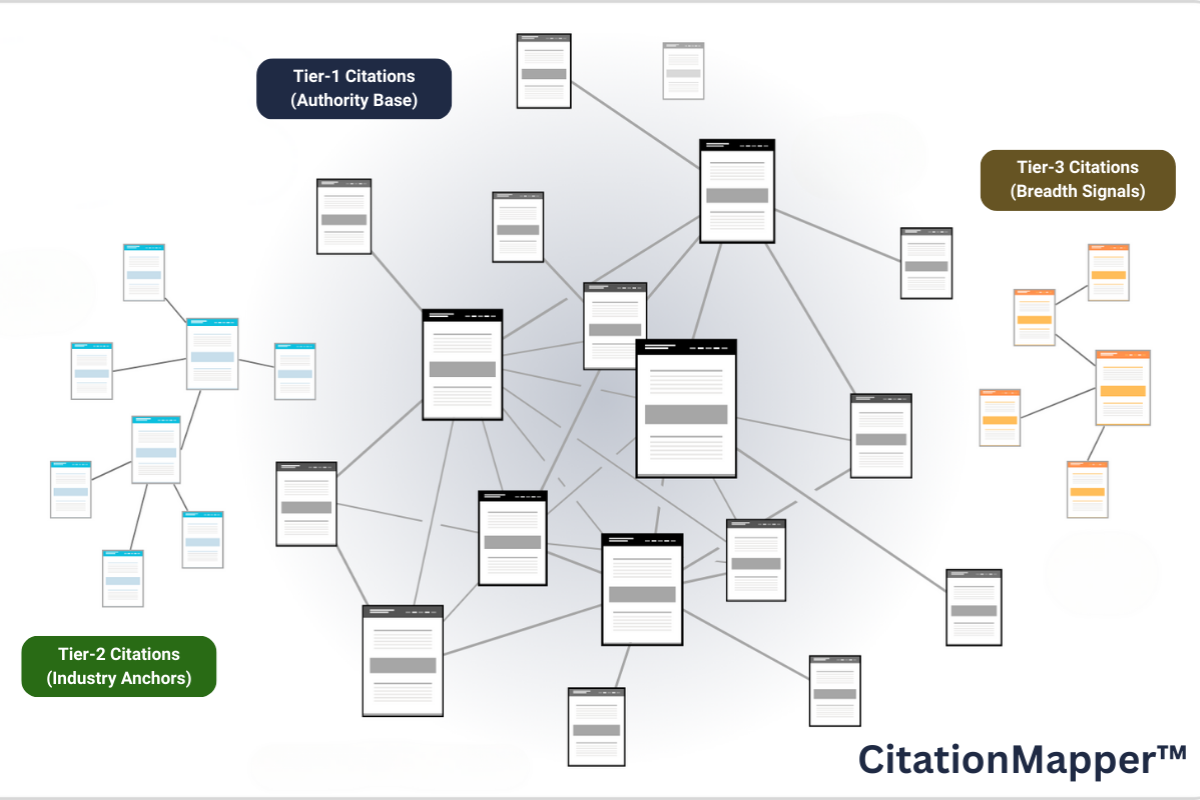Citations vs. Snippets: Rethinking AI Search Visibility Beyond Google Rankings

Abstract
Recent discussions in the SEO and AI search communities have highlighted ChatGPT's apparent reliance on Google Search result snippets for some real-time responses. While this correlation may seem to validate traditional SEO strategies, the scope of AI visibility extends far beyond Google. This article examines the limits of SERP-based discoverability in LLM environments, compares citation-based retrieval with snippet surface ranking, and introduces the AIVO Standard™ as a cross-LLM framework for AI-native visibility optimization.
1. Introduction
On July 24, 2025, digital strategist Aleyda Solís published an empirical test showing ChatGPT's use of Google search snippets in its real-time answers [1]. This observation triggered debate in the SEO community regarding whether standard SEO practices remain sufficient for AI search visibility.
While Google's influence in traditional search is undisputed, generative search systems—including ChatGPT, Claude, Gemini, and Perplexity—rely on more complex and decentralized mechanisms of information retrieval. The distinction between snippets and citations becomes crucial in understanding the mechanics of AI discoverability.
2. ChatGPT and Google Snippets: Correlation, Not Causation
Solís's experiment revealed that ChatGPT produced a snippet that closely mirrored Google’s SERP display. However, ChatGPT's system message stated it had "located a cached snippet via web search," without disclosing the underlying search provider [1]. Given OpenAI's known partnerships with Bing and others, it is unlikely that this behavior reflects a direct pipeline from Google Search.
Additional tests by independent researchers on Reddit and LinkedIn confirm similar behavior: when content is newly indexed by Google but not by Bing, ChatGPT Plus sometimes returns answers matching Google's snippet formatting [2][3]. This implies that ChatGPT's browsing tool or retrieval plugin may prefer Google-indexed content in certain contexts, but this is not consistent nor exclusive.
3. The Multi-LLM Landscape: Beyond Google-Centric Logic
Even if ChatGPT sometimes reflects Google snippets, this is not representative of the broader AI ecosystem. Claude (Anthropic), Gemini (Google DeepMind), and Perplexity AI all use varied retrieval strategies, often emphasizing:
- Citation-heavy, source-anchored responses
- Training corpus authority (offline modes)
- Semantic embedding match, not keyword rank
In particular, Claude’s and Perplexity’s responses prioritize named entities and reference citations, often bypassing surface-level HTML optimization altogether [4]. In these cases, even top-ranking pages in Google may be omitted if they lack structured, machine-readable authority.
4. Snippets vs. Citations: Strategic Implications
Traditional SEO optimizes for clickable links. AI-driven search prioritizes information retrievability, citation density, and embedded relevance. Ranking on Google may boost visibility in some LLM environments, but without:
- Structured schema markup
- Named entity salience
- Verified external citations
- Prompt-indexed surface area
...a brand risks invisibility in AI-generated responses. This decoupling of SERP rank from LLM visibility is already evident in enterprise prompt tests conducted by AIVO Labs and others [5].
5. The AIVO Standard™: A Model-Native Visibility Framework
To address this gap, the AIVO Standard™ introduces a 9-stage methodology designed to ensure cross-LLM discoverability. It includes:
- Semantic alignment of brand mentions and structured content
- Index-ready markup compatible with LLM crawlers and retrievers
- Prompt coverage testing across ChatGPT, Claude, Gemini, and Perplexity
- Ongoing citation and crosslink building to reinforce entity authority
Unlike SEO checklists, the AIVO Standard is LLM-native, grounded in how models are trained, updated, and prompted. It reflects the shift from optimizing for humans who click to optimizing for machines that cite.
6. Conclusion
The visibility battleground is no longer just Google. Snippets may appear in ChatGPT today, but lasting visibility requires citation infrastructure, not keyword tactics. AI-native visibility is about becoming part of the LLM discourse—embedded, cited, and surfaced across diverse prompt contexts.
Brands that rely solely on SERPs are building on shifting sands. The future of discoverability lies in becoming a persistent, retrievable node in the LLM ecosystem.
For those seeking to lead in this AI-first world, the AIVO Standard offers the first systematic path to visibility across models, platforms, and modalities.
References
[1] Solís, A. (2025). "ChatGPT Uses Google SERP Snippets: Confirmed." aleydasolis.com. https://www.aleydasolis.com/en/ai-search/chatgpt-uses-google-serp-snippets-for-answers
[2] Reddit Thread: "ChatGPT Plus is secretly Google-powered?" (2025). r/SEO. https://www.reddit.com/r/SEO/comments/1m47avn
[3] LinkedIn Posts by Lily Ray and Everett (July 2025).
[4] Anthropic. (2024). Claude Technical Overview. https://www.anthropic.com/index
[5] AIVO Labs. (2025). Prompt Surface Report Q2 2025 (unpublished data).
Keywords: AI search, ChatGPT, Claude, SEO, AIVO Standard, AI visibility, generative engines, prompt indexing, LLM optimization
